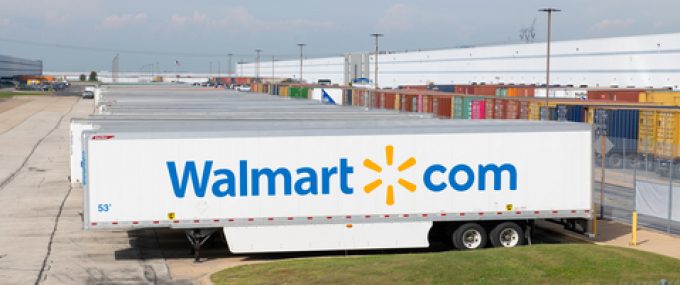Another drag on UPS Supply Chain Solutions
Still unquantified and unquantifiable

Merchants wondering how to get their products to consumers in the upcoming peak season now have a new option: Walmart has unveiled GoLocal, a final-mile service available to all retailers, it claims.
Any firm from small family businesses to national chains can use GoLocal for final-mile delivery and don’t have to offer their wares on the giant retailer’s marketplace to be eligible, it said.
Users have a variety of options, including same-day delivery and, unlike the integrated express carriers, Walmart is not trying to discourage the shipment of bulky and outsize items with hefty surcharges.
GoLocal is an extension of the retail giant’s express delivery service for its own products, which pledges delivery in two hours. It has grown rapidly over the past three years and covers more than 160,000 products shipped from about 3,000 stores, which reaches close to 70% of the US population.
“In an era where customers have come to expect speed and reliability, it’s more important than ever for businesses to work with a service provider that understands a merchant’s needs,” said John Furner, president & CEO of Walmart US.
The launch of the new product is hardly a surprise. Walmart has started deliveries with branded vehicles in Arkansas and, in July, announced it would sell its e-commerce technology to merchants. It has also moved to draw in retailers from outside the US – in March it opened its Marketplace to foreign sellers, which was reportedly taken up quickly by about 100 Chinese firms.
In current market conditions, any additional capacity will be picked up, especially in the looming peak season, commented Cathy Morrow Roberson, founder and head analyst of consultancy Logistics Trends & Insights. “Even a small amount of capacity will be welcome,” she added.
According to UPS, the parcel delivery sector in the US will face a capacity shortfall of some 5,000 parcels a day in this peak season.
But Ms Roberson points out that Walmart’s new service will not boost overall capacity. The retailer is going to use gig workers already in its Spark Driver programme for its own grocery delivery service, and has indicated that, down the road, it intends to use more of its associates for the service. But for now it relies on private operators.
“Basically, Walmart is using the same last-mile providers as everybody else,” said Ms Roberson.
Many of these gig drivers are working for multiple clients and Ms Roberson likened them to truckers who use apps to look for shipments that best fit their schedules and promise good returns.
Lately, new options have emerged for US merchants to get their goods to
consumers. Last month saw the emergence of the FrontDoor Collective, a
network of franchised final-mile operators with common service standards
offering same-day and next-day service. The firm’s two founders are
ex-Amazon executives and the outfit currently musters several hundred
operators, according to a spokesman.
And Scott Ruffin, who spearheaded the establishment of Amazon’s US air network, has garnered investment to build up Pandion, which is setting up a national network for parcel delivery. According to Mr Ruffin, this should be ready for launch shortly, in time for the peak season.
However, capacity is going to remain a challenge, Ms Roberson warned. “Retailers will have to be creative,” she said, adding that they should consider a variety of options, such as kerbside pick-up and parcel lockers.
But for those who turn to Walmart and its new service, she has a question: “A small or mid-sized retailer that considers Walmart for final delivery should ask itself ‘what is Walmart going to do with my data?’.”
Comment on this article